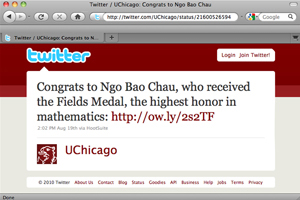News afield
Did you know an incoming University mathematician won a Fields Medal? (Chances are you didnít hear it here first.)
By Amy Braverman Puma
Soon after I arrived at the office August 19, two colleagues approached my desk. “Did you hear we won a Fields Medal?” they asked. No, I hadn’t heard.
Later came an e-mail from Steve Koppes, who covers the physical sciences for the University News Office. “Ngô Bao Châu, who joins our Math faculty Sept. 1, has received the Fields Medal (more or less regarded as the Nobel for mathematics),” Koppes wrote. He asked how the Magazine might cover the news; he was putting together a summary of Fields-related communications. Although we couldn’t write a story before deadline, I e-mailed back, we would tweet it that day and put an item in For the Record.
Wait a minute, I thought. A summary of Fields-related communications? It was a reminder that the University doesn’t announce news the way it used to. These days, like many of its counterparts, the University Communications office makes plans. Thinks about how best to get the word out. What media to use. Whether links or videos might be helpful. The whole package.
“We’re now in a universe where there are a thousand ways to reach people directly,” says Steve Kloehn, associate vice president for news and public affairs. “We see communications as everything from the official press release to a party or event.”
The press release still gets done. Koppes wrote one that went up later that morning. It included the relevant information: that Ngô won the Fields, awarded every four years to mathematicians under 40, for his proof of the fundamental lemma. Math department chair Peter Constantin explained that Ngô’s proof “builds on the combination of decades of work by many great mathematicians” and “has relevance to the world, including high-energy physics, computer science, and cryptography.”
A few days later Koppes sent me a copy of his communications summary. Besides posting the release on the UChicago home page, he’d pushed it out to three science news wires. His office added Ngô’s bio to the University’s “experts” web page. Three targeted e-mails went out to different lists. Several Twitter accounts shared the information.
For Kloehn’s office, the Fields was a “relatively average story”—big news, of course, but no out-of-the-ordinary communications. And although the channels of contact have multiplied, “we’re still trying to tell the story of the University,” Kloehn says: path-breaking scholarship and new ideas.
As routine as the process may have become, Koppes, who’s been at Chicago for 12 years, remembers when many reporters didn’t use e-mail. He relied on phone, mail, and fax. Now, by posting on the University and science news sites, he reaches a broader audience. The media pick up the story, and so do scientists elsewhere, some of whom want to collaborate with the Chicago researchers.
As readers follow the news more quickly, demand for it grows. The morning the Fields was announced, three alumni who’d heard about the honor e-mailed Koppes. “Where’s the story?” one asked. “Check again,” Koppes replied. “It’s there now.”
Maternal appreciation
During my recent maternity leave (Evelyn joined big brother Jackson April 29), the Magazine was in capable hands. Thanks to my fellow editors for taking on added workloads. As if to show just how capable they are, while I was out we received word that the Magazine had won a CASE gold medal for staff writing. The winning entries were “Honor Bound” and “The Fighter Still Remains” by Jason Kelly; “On the Line” and “Life Under Wraps” by Lydialyle Gibson; and “Studs: A Lifetime of Listening” by Carrie Golus, AB’91, AM’93.—A.B.P.

